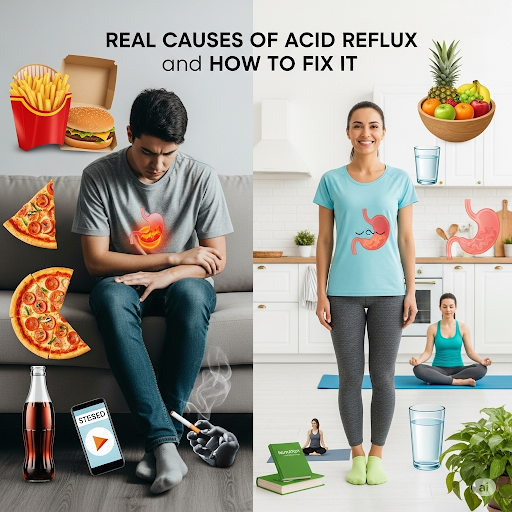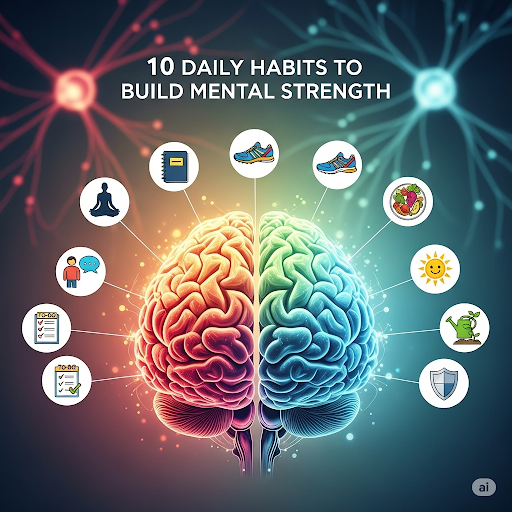Introduction: When the Burn Becomes a Burden
You’ve just finished a delicious meal. The flavors are still lingering, and then bam! A burning sensation creeps up your chest like a slow, fiery wave. You shift uncomfortably, try sipping some water, maybe even chew a mint. But the burn persists. That’s acid reflux your stomach’s dramatic way of saying something isn’t sitting right.
Millions of people experience acid reflux, often brushing it off as “just heartburn.” But what if it keeps happening? What if it starts to interfere with your meals, sleep, and peace of mind? That’s when we need to dig deeper.
The truth is, acid reflux isn’t just about eating spicy food or lying down too soon. The real causes go further than we think and fixing it doesn’t always mean popping antacids. Let’s unravel what’s really going on and explore how to soothe the fire, naturally and effectively.
It’s Not Always About Too Much Acid Sometimes It’s Too Little
This might surprise you, but one of the most overlooked causes of acid reflux is low stomach acid, not high. Yes, you read that right.
Stomach acid, or hydrochloric acid (HCl), is essential for digestion. It breaks down food, kills harmful bacteria, and helps absorb nutrients like B12 and magnesium. But when acid levels are too low, food sits in your stomach longer than it should. It ferments, creating pressure and that pressure pushes contents (including acid) up into your esophagus.
So while you feel the burn and reach for acid blockers, the real issue might be that your stomach isn’t acidic enough to digest properly. And that’s a game-changer.
Fix it: Instead of suppressing acid, consider supporting it. Try sipping a teaspoon of raw apple cider vinegar in water before meals. Digestive bitters and hydrochloric acid (HCl) supplements can also help but always under guidance from a healthcare provider.
A Weak Lower Esophageal Sphincter (LES): The Leaky Door
Think of the lower esophageal sphincter (LES) as the “door” between your stomach and your esophagus. It opens to let food in, then closes to keep the contents (and acid) down where they belong. When that door gets lazy or weak, reflux becomes inevitable.
Things like overeating, alcohol, caffeine, nicotine, and certain medications can relax the LES, making it less effective at sealing the acid inside your stomach.
Even lying down too soon after eating gives gravity the upper hand, allowing acid to sneak back up where it doesn’t belong.
Fix it: Avoid heavy meals, especially before bedtime. Eat slowly, chew well, and consider elevating the head of your bed. And yes, ease up on triggers like alcohol and coffee (even decaf can relax the LES).
Hiatal Hernia: The Invisible Push
A hiatal hernia happens when part of your stomach pushes through the diaphragm and into your chest. This creates an opening where acid can easily escape into the esophagus. Many people don’t even know they have a hiatal hernia it often goes undetected unless symptoms become severe.
This structural issue can disrupt normal digestion and exacerbate reflux. In some cases, chronic reflux may cause or worsen a hernia.
Fix it: A chiropractor or functional practitioner trained in visceral manipulation may help reposition a small hernia naturally. For more serious cases, medical or surgical intervention may be necessary. Meanwhile, gentle core exercises and not lying flat after eating can help reduce pressure.
Food Triggers Aren’t Always Obvious
Everyone knows that spicy food and citrus can trigger reflux. But many culprits hide in plain sight. Processed foods, fried items, chocolate, onions, tomatoes, mint, and even dairy can quietly contribute to reflux symptoms.
The real issue? It varies from person to person. What bothers you might not bother someone else. That’s why understanding your body is key.
Fix it: Try an elimination diet. Remove common triggers for two to three weeks, then reintroduce them one by one. Keep a food and symptom journal to identify patterns. Your body will tell you everything you need to know if you listen.
Poor Gut Health and Bacterial Imbalance
An unhealthy gut isn’t just about bloating or irregular bowel movements it affects everything, including acid reflux. A disrupted gut microbiome can lead to overgrowth of harmful bacteria like H. pylori, which can reduce stomach acid production and cause inflammation.
Small Intestinal Bacterial Overgrowth (SIBO) can also be a hidden culprit. Gas buildup from bacterial fermentation increases intra-abdominal pressure, pushing acid up.
Fix it: Focus on gut health. Probiotic-rich foods like yogurt, kefir, kimchi, and sauerkraut can help restore balance. Prebiotic fiber (from foods like bananas, garlic, onions) feeds good bacteria. For deeper issues, consult a practitioner for gut-healing protocols.
Stress: The Invisible Trigger
Chronic stress wreaks havoc on your digestion. When you’re stressed, your body shifts into “fight or flight” mode, directing blood away from the stomach and slowing digestion. That alone can lead to bloating and reflux.
Stress also affects your vagus nerve, which controls digestive flow. If the vagus nerve isn’t firing properly, your stomach may not empty efficiently, increasing pressure and reflux risk.
Fix it: Prioritize stress reduction. Practice deep breathing, yoga, or meditation. Even five minutes of mindfulness before meals can help activate “rest and digest” mode, improving digestion and reducing symptoms.
Poor Eating Habits and Overeating
We live in a fast-paced world where meals are often rushed, eaten in the car, or gulped down between meetings. Eating too quickly, not chewing thoroughly, or simply eating too much stretches the stomach, putting pressure on the LES and making reflux more likely.
It’s not just what you eat it’s how you eat.
Fix it: Slow down. Chew each bite thoroughly (aim for 20–30 times). Eat smaller meals more frequently if needed. And most importantly, sit upright during and after meals don’t go horizontal too soon.
Nutrient Deficiencies and Medications
Long-term use of antacids, PPIs (proton pump inhibitors), or other reflux medications can actually make things worse over time. They suppress acid so effectively that nutrient absorption suffers especially magnesium, calcium, zinc, and vitamin B12.
This creates a vicious cycle: low nutrients lead to weaker digestive muscles and nerves, which worsen reflux, which prompts more medication.
Fix it: Talk to your doctor about stepping down medication safely. Support digestion naturally with supplements, lifestyle changes, and nutrient-dense food. Consider magnesium, B-complex, and digestive enzymes to boost your body’s ability to heal.
Being Overweight or Having Extra Belly Fat
Extra abdominal weight puts pressure on the stomach and LES. It’s like pressing down on a water balloon something’s bound to escape. This pressure can force acid back into the esophagus, especially when lying down.
Even modest weight loss can drastically reduce reflux symptoms.
Fix it: Aim for gradual, sustainable weight loss through balanced meals, movement, and stress reduction. You don’t need to be “skinny” just take pressure off your digestive system, and it will thank you.
Lack of Movement After Eating
Ever eat a heavy meal and then go sit on the couch for hours? Lack of movement slows digestion and encourages acid to linger in the stomach. Gravity is one of your best allies when it comes to keeping acid down so if you’re lying flat, you’re letting it flow where it wants.
Fix it: Take a gentle 10–15-minute walk after meals. It helps stimulate digestion, balance blood sugar, and reduce reflux. Simple, but powerful.
Final Takeaway: The Body Always Speaks Are You Listening?
Acid reflux isn’t just about random heartburn it’s your body asking for help. It’s telling you that digestion is off-balance, whether from stress, food choices, low stomach acid, or lifestyle habits. And while antacids offer quick relief, they’re just a band-aid.
The real healing begins when you listen to those internal messages. Support your body with mindful eating, proper nutrient intake, good posture, and stress care. And if symptoms persist, work with a practitioner who can look at the full picture not just suppress the fire, but uncover the spark that started it. Because when digestion runs smoothly, everything else tends to follow.












